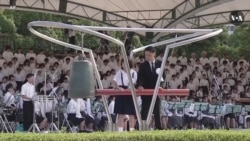Remembering the Nagasaki and Hiroshima bombings 79 years ago.
Marking 79 years since the US nuclear bombings on Hiroshima and Nagasaki.
Welcome to VOA Asia Weekly. I'm Jessica Stone in Washington. That story is coming up, but first, making headlines:
Bangladesh swore in a new government led by Nobel Peace Laureate, Muhammad Yunus Thursday. It comes just three days after Prime Minister Sheikh Hasina resigned and fled the country. At least 250 people died in a crackdown on protests against job quotas and ultimately, her government.
Cambodia broke ground this week on a 180-kilometer canal linking the capital city of Phnom Penh to the Gulf of Thailand. China is financing the $1.7 billion dollar project through its belt and road initiative. Cambodian officials hope that the Funan Techo canal will lower the cost of shipping and reduce reliance on Vietnamese imports. Others are concerned about the environmental impact on the flow of the Mekong River.
Thai businessman and politician Pita Limjaroenrat was banned from politics for 10 years and his party dissolved Wednesday over his attempt to reform the kingdom's royal defamation laws. The Constitutional Court in Bangkok voted "unanimously" to dissolve the Move Forward Party. Member lawmakers says they will form a new party. Here’s what Pita told VOA ahead of the decision.
Pita Limjaroenrat; Move Forward Party leader: The definition of a Constitutional monarch of Thailand will be at stake.
The Philippines and Vietnam kicked off their first joint coast guard training in Manila Bay this week. Both nations have competing claims with Beijing over parts of the South China Sea. Friday’s drills will focus on search and rescue as well as fire and explosion prevention, according to Philippine officials.
South Korean pistol shooter Kim Yeji returned home after winning the silver medal in the Olympic games. She thanked Tesla CEO Elon Musk for making her a social media sensation after he praised her on X, formerly known as twitter.
Japan issued a tsunami advisory after a 7.1 magnitude earthquake occurred off the southern island of Kyushu. It happened at around 4:42 pm local time on Thursday.
Japan marked the 79th anniversary of the bombings of Hiroshima and Nagasaki this week at a time when the nation is undergoing profound changes in its attitude to war. Henry Ridgwell reports.
At 8:15am on Tuesday – the exact time that the atomic bomb exploded 600 meters above Hiroshima on August 6, 1945 – Japan held a minute’s silence to remember the horrors visited on the city
“It is the mission of Japan, the only country to have suffered nuclear war, to pass on the reality of the atomic bombings to future generations,” said Fumio Kishida, Japanese Prime Minister.
The manner of Japan’s defeat changed the country, driving an aversion to war and military power that lasted for generations. But analysts say that is changing – as the country faces numerous regional threats.
“The DPRK's (North Korea’s) nuclear missile programs, Chinese military assertiveness, territorial claims in the East China Sea, Russia's closer military cooperation with China in the past couple of years.” Yee Kuang Heng, University of Tokyo told VOA in an interview.
Those threats prompted Japan to last year announce a doubling of defense spending to 2 per cent of GDP by 2027.
Last week, the United States - Japan’s closest ally – announced a major upgrade of its military command in the country.
Tokyo has repeatedly sought assurances from the U.S. that it would be prepared to use “extended deterrence” or its nuclear weapons to defend Japan.
“They have always had doubts about the American commitment to use all their might to defend them. And that includes nuclear weapons,” said retired U.S. marine colonel, Grant Newsham, who serves as a senior fellow at the Washington-based Center for Security Policy.
For decades, anger among its Asian neighbors over Japan’s actions in World War II prevented closer cooperation. That’s also changing, analysts say.
“Countries like the Philippines, they've recently signed very important defense agreements with Japan, such as the Reciprocal Access Agreement; actually the first Asian country to do so with Japan. South Korea, notably under President Yoon (Suk Yeol), has talked up a more forward-looking relationship with Japan,” said Yee Kuang Heng, University of Tokyo.
Responding to Japan’s changing military posture, China last month said that Tokyo needs to “seriously reflect on its history of aggression.”
Analysts say Japan is facing up to multiple threats – not least from China itself.
Henry Ridgwell, VOA News, Tokyo
Visit voanews.com for the most up-to-date stories.
I’m Jessica Stone.
Finally, she’s named for one Olympic games and now participating in her first.
19 year old Sydney Francisco of Palau is named after the Olympics where her mother – Peoria Koshiba – competed in the 100 meter race in the 2000 Sydney, Australia Olympic games. Koshiba went on to compete in the 2008 Beijing games as well. This year, Sydney competed in the women’s 100 meter preliminary round, but did not advance to round one of competition.
Thanks for watching VOA Asia Weekly.











